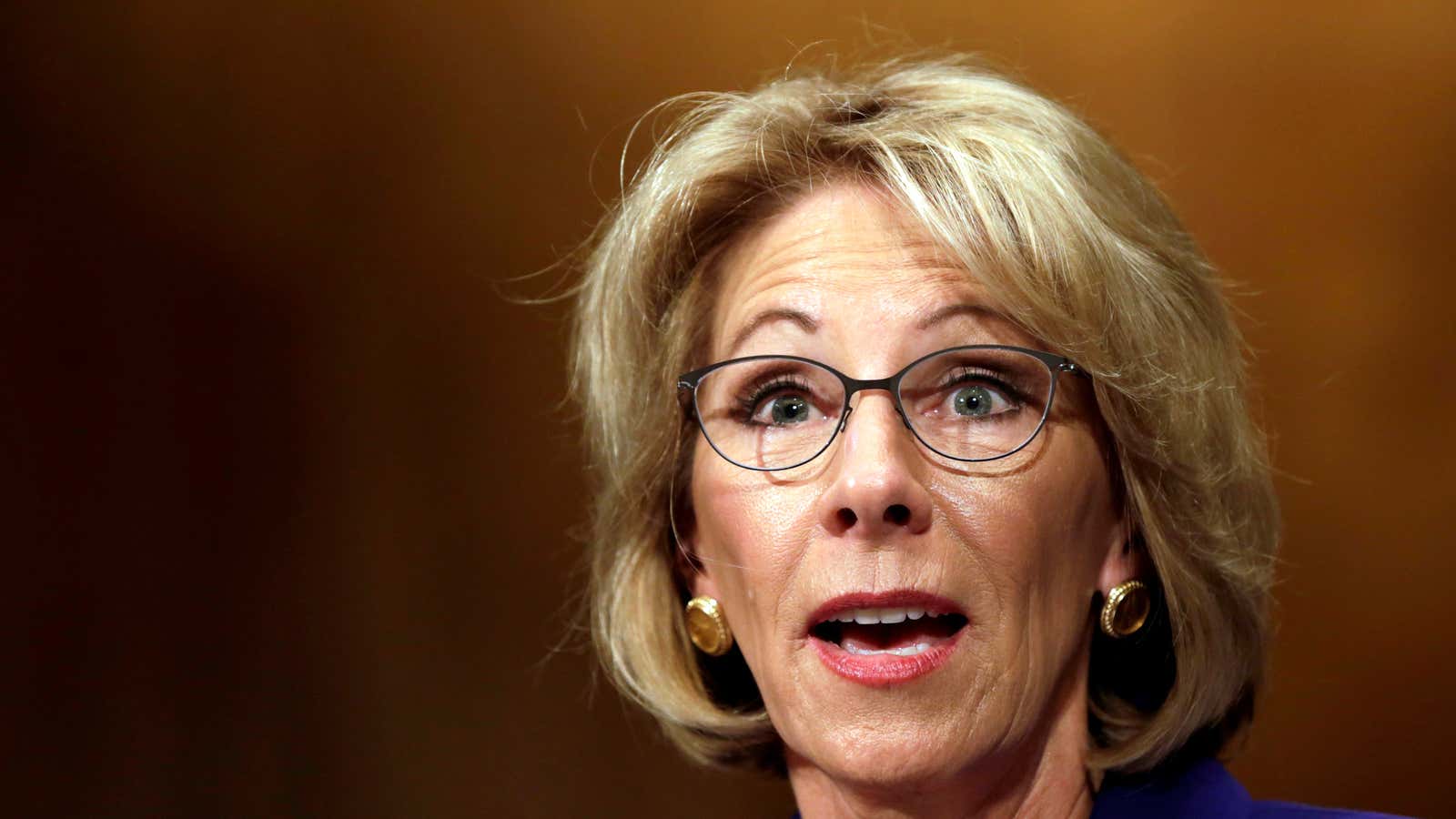“Potential grizzlies,” Betsy DeVos stammered during her Jan. 17 Senate confirmation hearing, in a deeply odd answer to the question of whether she supports having guns in American schools. Yet at least it was something.
DeVos—a Michigan billionaire, an advocate of the school choice movement, and US president-elect Donald Trump’s searingly controversial pick for US education secretary—faced more than three hours of questioning from senators from the Committee on Health, Education, Labor, and Pensions, on topics ranging from charter schools to her personal conflicts of interest. Teachers, policy experts, and parents around the country had awaited her answers with heavy anticipation ever since Trump named her as his nominee to lead the US’s federal education system.
They didn’t come. DeVos, already sharply criticized for having neither a professional nor personal background in public education (she attended private school and sent her children to them as well), spent most of her hearing giving neutral, noncommittal responses or hedging around actual policy stances.
Weapons in schools
The issue of whether guns should be allowed in schools—a topic explored by senator Chris Murphy of Connecticut, whose state suffered the devastation of the 2012 Sandy Hook Elementary School shooting—is “best left to locales and states to decide,” DeVos said. It was arguably a non-answer in itself, but one made all the more awkward by her decision to follow it up with the caveat that some schools, like one particular elementary school in Wyoming that was referenced earlier in the hearing, might need guns to protect students from grizzly bears.
Still, the specification there made the answer clearer than many of her others.
Free college and the student debt crisis
DeVos similarly dodged when Vermont senator Bernie Sanders asked if she’d consider working with him on tuition-free policies for public colleges and universities:
I think that’s a really interesting idea. And it’s really great to consider and think about. But we also need to consider the fact there’s nothing in life that’s truly free, somebody’s going to pay for it. We can work together and work hard on being sure college or higher education in some form is affordable for all young people who want to pursue it.
And she admitted, under questioning from Massachusetts senator Elizabeth Warren, to knowing next to nothing about student loan programs.
Sexual assault on college campuses
Washington senator Patty Murray, the ranking Democrat on the committee, said in her opening remarks that she is concerned with DeVos’s lack of understanding about campus sexual assault. “I was not happy about how you talked about this issue when we met,” Murray said. “I’m hopeful you have learned more about it since then and are prepared to address it seriously.” Rape survivors started a campaign earlier this month urging the nominee to support stringent laws around campus safety and assault reporting.
But again, DeVos hedged. Asked whether she would uphold policies created by the Department of Education in 2011 that established strict investigation standards for sexual assault cases on college campuses under the federal law Title IX, DeVos said it would be “premature” to give an answer.
Proficiency versus growth
In what may have been the most embarrassing moment of her hearing, DeVos seemed not to understand a question asking for her opinion on whether student test scores should be measured based on growth or proficiency—a debate that swirls in teachers’ circles, and that senator Al Franken of Minnesota had to explain to her. She declined to offer an ultimate reply.
Support for accountability, and disability rights
Virginia senator and Hillary Clinton running mate Tim Kaine pressed DeVos on whether she will make sure all schools—charter, public, or otherwise—will be held to the same standards. He didn’t get far.
Kaine: “If confirmed, will you insist upon equal accountability in any K-12 school or educational program that receives taxpayer funding, whether public, public charter, or private?”
DeVos: “I support accountability.”
Kaine: “Equal accountability?”
DeVos: “I support accountability.”
Kaine: “Is that a yes or a no?”
DeVos: “I support accountability.”
Kaine: “Do you not want to answer my question?”
DeVos: “I support accountability.”
When Kaine asked for her opinion on the Individuals with Disabilities in Education Act (IDEA), a civil rights law that allocates federal money to special services for disabled students, he was met with another dead end. DeVos said she thinks states should decide whether schools need to meet special education requirements.
“So some states might be good to kids with disabilities, and other states might not be so good, and then what, people can just move around the country if they don’t like how their kids are being treated?” Kaine asked.
The tension was made all the sharper when New Hampshire senator Maggie Hassan, who has a son with cerebral palsy, asked whether DeVos understood that IDEA was a federal law; DeVos admitted she “may have confused it.”
Her own qualifications for the job
Over the course of the hearing—and, more broadly, ever since Trump picked her as his nominee—it became clearer and clearer that DeVos lacked many of the professional qualifications of her predecessors.
Asked Sanders at one point: “I don’t mean to be rude, but do you think if you were not a multi-billionaire, if your family has not made hundreds of millions of dollars of contributions to the Republican Party, you would be here today?”
DeVos, in her noncommittal style, responded, “Senator, as a matter of fact, I do think that there would be that possibility.”
